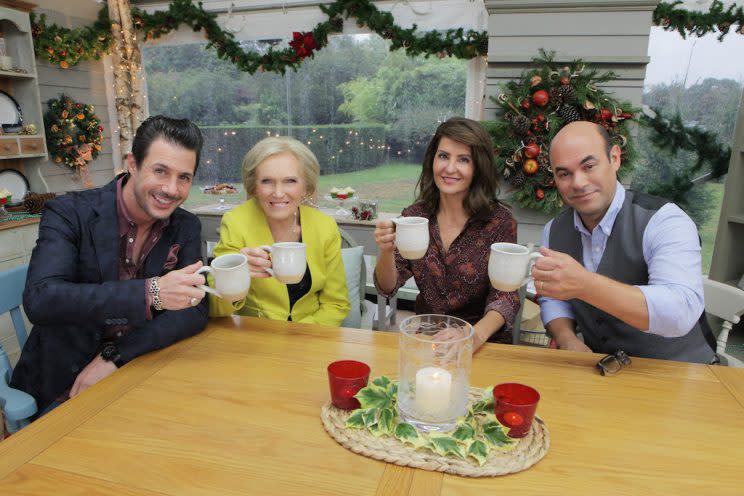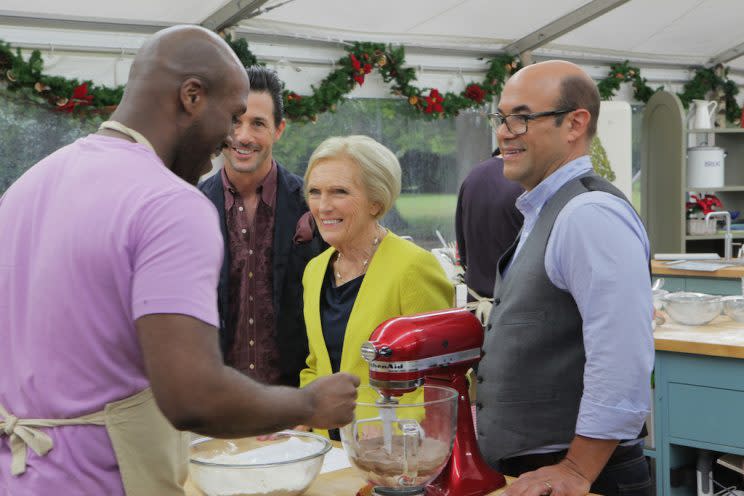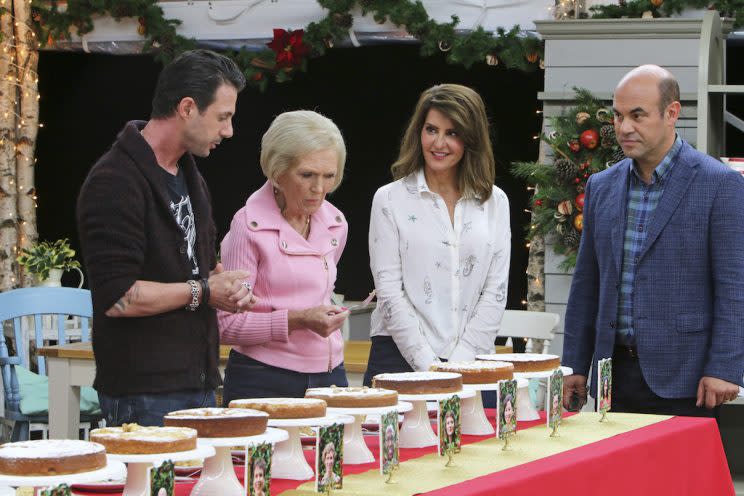‘The Great American Baking Show’ Succeeds in Importing a British Classic

There are plenty of British reality shows that survive the trip across the pond: Antiques Roadshow, Dancing With the Stars, and — ironically — American Idol all came from the U.K. The Great British Bake Off is so peculiarly British, though, that an Americanized version — The American Baking Competition, hosted by Jeff Foxworthy — has already been tried and failed. So how does ABC fare with a second attempt, The Great American Baking Show?
Surprisingly well, actually. Some will say that the secret is in bringing Mary Berry over from the original series, but the truth is, it works because it’s only American in name. This time, the producers did everything they could to make the show feel like the original British competition.
That means the music remains pastoral. The hosts are low-key and given to making terrible puns. The colors of the set are the same. The contestants aren’t encouraged to be at each other’s throats, and there are no secret confessionals to stir drama. The only thing that’s changed is the name (Pillsbury owns the rights to the term “Bake Off”), and the baby goats that inexplicably populate the interstitial shots of the U.K. version have been left at home.
What has made the GBBO successful worldwide (it airs as The Great British Baking Show on PBS and Netflix) is its singular lack of conflict. After years of reality contestants screaming, insulting, and assaulting each other, fans are comforted by the show’s friendliness, calm, and complete lack of bluster. In seven seasons, there’s only been one blowup, and the biggest scandal was the year when the hosts got a little too racy with their innuendos.

Berry is, of course, key in making this all work. She gives off a grandmotherly vibe, but the kind of grandmother who was a spy back in the day and still knows a dozen ways to kill a man with a pastry bag. The breadth and depth of her baking knowledge is both comforting and terrifying. You know you’re in good hands, but you also feel for the contestants who can’t sneak any mistakes by her.
Berry’s fellow judge, Johnny Iuzzini, is no stranger to reality competitions: He was the head judge on Top Chef: Just Desserts. But he’s still finding his place on this show. His British counterpart, Paul Hollywood, was more outwardly critical of the bakers than Berry, but Iuzzini restrains himself — probably to keep the show from devolving into just another shouty competition like Hell’s Kitchen or Beat Bobby Flay. With only eight episodes, it will be interesting to see if Iuzzini and Berry form as complementary a relationship as the old Berry/Hollywood pairing.

Ian Gomez (Supergirl) and Nia Vardalos (My Big Fat Greek Wedding) are enjoyable presences and don’t do anything you could call wrong, but if there’s an aspect of the show that doesn’t live up to the original, they are it. Sue Perkins and Mel Giedroyc’s jokes border on the vaudevillian but are delivered with an understated primness that is completely disarming. It’s almost unfair to compare anyone to them because it’s kind of impossible to replicate what they do. Like Iuzzini, they hope to find a way to live up to the originals while finding their own spin.
It’s ironic that a reality show that, for seven seasons, has defined itself by how little drama occurs onscreen should have so much drama off. When GBBO left the BBC for the piles of cash offered by another network in September, three of the four hosts decided to stay with the BBC, Berry among them. This series was probably filmed before they parted ways, so she’s unlikely to return for another season.

Would the show survive without Berry? Possibly, but they have a lot of work to do. The original GBBO spawned a revival in traditional British baking around the U.K. It’s unlikely that this show will have that much of a cultural impact, but if it can tap into that same nostalgia, it might find life, post-Berry.
The Great American Baking Show airs Thursdays at 9 p.m. on ABC.